Publications
The subjects taught at the Department of Human Resource Management are covered in textbooks and multimedia learning aids, which were written, and compiled, by department personnel. These publications cover all aspects of HRM, as well as dealing with all the latest trends and practices in the field.
Professional publications and textbooks: |
|
Palíšková, M. The Labour Market in the European Union – Historical Developments, Current Trends and Perspectives. Prague : C.H.Beck, 2014The functioning of the labour market is based on fundamental economic principles, similar to those in other markets. Even here, supply and demand meet and subjects on the labour market strive to maximise the benefits they receive from their interactions on that market. What constitutes the uniqueness and, at the same time, the complexity of the functioning of the labour market? In what ways is the labour market different from other markets? What are the current issues, and prospects for further development, affecting the European labour market? This is an example of just some of the questions which the book tries to answer. The uniqueness of this publication lies, in particular, in the fact that it provides us with a “complex” view of the given issue. The qualifier “complex” is not to be understood in the sense of capturing all the aspects and processes, which can be found on labour markets; but rather it means examining the key trends from a global perspective; that is, in a broader context – especially from the point of view of the economic, historical, legal and social aspects. |
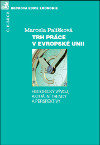 |
Dvořáková, Z. et al. Human Resource Management. Prague: C.H.Beck, 2012.This professional publication is the only one on the Czech book market which gives a comprehensive overview of Human Resource Management:
The text is divided into four parts. Part I. Personnel work in a company captures the development of opinions on personnel work and changes in the organisation of personnel work in the company [from personnel activities to Human Resource Management].Part II. The external environment in which the company operates, as well as its personnel activities indicate the changes in the external environment, as well as how these changes project themselves into both individual personnel activities and into the company’s overall HRM strategy. The text deals with: the labour market in the European Union; the specifics of the labour market in the Czech Republic, including new developments in labour law, as well as in personnel processes in companies; – strategies and planning in HRM; finding, selecting and adapting employees; the organisation of work and working conditions; health and safety at work; motivation to work harder as well as to lead the workers; managing work performance, as well as employee evaluation; remuneration, training and development of employees.Part III. Trends in HRM evaluate the use of information and communications technology in HRM; characterise company communications; the levels of social responsibility of corporations and HR controlling. Part IV. Under specific conditions, HRM comes close to the specifics of personnel work in transnational corporations, in small companies as well as in private non-profit organisations. Contributions made by the publication:
|
 |
Dvořáková, Z., Smrčka, L. et al. Financial Education for Secondary Schools. Prague: C.H.Beck, 2011.The purpose of the textbook is to provide complex and systematic knowledge about financial education and financial literacy, so that students gain knowledge of, as well as practicing the skills necessary for the management of households and financial products before they enter the financial market. The pivotal chapters are money, household management, financial products and consumer protection. Knowledge of these, and other, areas in the book are illustrated by the use of a whole host of examples from life. The textbook contains a collection of already solved case studies [on CD], which will help pedagogues to prepare their lessons in subjects from the area of financial literacy. The textbook is meant for students of secondary schools in the Czech Republic. It can be used just as effectively in the preparation of students of pedagogical faculties for their future profession as secondary school pedagogues. The concept and structure of the textbook arises from the Strategy of Financial Education in the Czech Republic [2007], as well as from the document A System for the Building of Financial Literacy in Primary and Secondary Schools [2007].
|
 |
Dvořáková, Z. et al. Human Resource Management. Prague: C.H.Beck, 2007.The textbook contains the complex interpretations of personnel work in an organisation. The book is divided into four basic parts. The first part defines the aim and content of personnel work, presents the development of opinions on personnel management and the description of the organisation of a personnel department. The second part is devoted to a detailed examination of personnel activity. The starting point is the characteristics of the labour market and the effect which the EU has on the formation of the workforce in a company. The third part concentrates on the methods for measuring and evaluating the effectiveness of personnel work, such as how intellectual capital is evaluated, peronnel audits, personnel benchmarking and the like. The last part presents the specifications of people management in transnational corporations, small companies and non-profit organisations. The textbook is primarily meant for university students who are specialising in HRM. The up to date information, the newest trends and practical examples contained in this work, however, can be suitable inspiration for those who direct workers in the world of practice. |
 |
Dvořáková, Z. et al. Dictionary of HRM Terminology. Prague: C.H. Beck, 2004.The dictionary contains the jargon from the area of HRM. It includes: the issues of the labour markets and employment: the organisation of personnel work and activities; personnel strategy and planning; performance management; gaining and selecting workers; training; motivation of workers and the like, including the questions of labour law, remuneration, work organisation, social development and personnel information systems. Issues such as social policy and employment policy of the European Union are also contained within the dictionary. The text captures the latest developments and basic trends in this area. The jargon is individually and methodically processed, mutually interconnected and contains links to literature and webpages. The dictionary is meant for the broader professional public, especially managers and university students. |
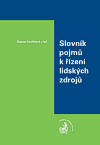 |
Kleibl, J., Dvořáková, Z., Šubrt, B. Human Resource Management. Prague: C.H. Beck, 2001.The requirements of today’s world have changed the demands placed upon the management of firms in the all areas of management. At the same time it shows that the principal competitive advantage of firms is how they manage to develop their human resources in the global environment, where the traditional approaches to management are becoming ineffective. The publication interprets the aims, methods and trends in personnel management. These are, for instance: the concept of HRM and its benefits for management; restructuralisation of personnel work and changes in the position of the line manager; finding and selection employees; stabilisation and outplacement; management of work performance and behaviour; motivation and remuneration; the specifics of international HRM; labour relations and collective agreement relations and the like. |
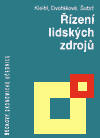 |
Kotýnková, M.-Němec, O. Human Resources on the Labour Market. Development and Tendencies in Connection with the Accession of the Czech Republic to the EU. Havlíčkův Brod: Professional Publishing, 2003.The book focuses on the development of human resources today, in the period since the accession of the Czech Republic to the European Union. The first part of the book deals with the development of human resources on the European labour market; it is devoted to European employment strategies as well as the European processes of the social inclusion of disadvantaged individuals and groups to the life of society by means of the use of the labour market. The second part of the book is devoted to the Czech labour market. The emphasis here is on the issues of employment policy, the functioning of public employment services and the role of the state in these processes. Attention is also given to the social dimensions of the labour market, which is linked to unemployment, low paid jobs and the subsequent poverty, as well as to social exclusion. The book is meant not only for personnel managers, labour exchanges, employment agencies and consultancy ifirms, but also for university students. |
 |
Koubek, J. The ABC of Practical Human Resource Management. Prague: Linde, 2000.The aim of the book is to attempt to answer the questions ‘‘How‘‘ and „Why“, and thus to offer not only HR workers, but to those whose job it is to lead workers at all levels, a practical guide for their everyday work with people. The following chapters try, at least in part, to acquaint the Czech reader with some of the newest practical steps in personnel work, as well as how to approach them. |
 |
Koubek, J. English-Czech Expository Dictionary of Human Resource Management; Prague: Management Press, 2003.The English-Czech expository dictionary contains more than 2,600 professional terms from the sphere of Human Resources, and it is the first of its kind on our book market. The author is a foremost Czech expert on HRM, as well as being a teacher at the Prague University of Economics and Business, and the author of the popular textbook Human Resource Management. He compiled the dictionary for two main reasons; first of all, to enable the Czech reader, who studies the professional HRM literature in the original foreign language version, to better orient himself/herself in the English text. In the second place, the author wished to contribute to the formation of a body of professional HRM terminology in the Czech language. This latter aim was to reduce the unecessary use of too much Angliscisms, some of which were given incorrect meanings. The dictionary is appreciated by, in particular, people working in the field of HRM, pedagogues, students, journalists, editors, translators and employees of transnational corporations. |
|
Koubek, J. German-Czech Expository Dictionary of Human Resource Management. Prague: Management Press, 2005.This dictionary was written by an iminent Czech author, who is an acknowledged expert in the field of Human Resource Management. It is linked to his „English-Czech Expository Dictionary of Human Resource Management, and was issued in 2003 by the publishing house Management Press. Its aim is to enable those Czech readers, who study professional literature on HRM in German, to better orient themselves in the texts and to find the correct Czech equivalent of the terminology used by German, Austrian and Swiss authors of Human Resource literature. A further aim of this work is to facilitate professional communications between Human Resources department personnel and other managers in the firm in which German capital plays a part. The dictionary is further enriched by the Angliscisms which to an ever greater extent appear in Human Resource Management in German speaking countries. |
|
Koubek, J. Personnel Work in Small Companies. Prague: Grada, 2003.This book is designed to help owners and managers of smaller firms; which have neither specialised HR departments nor HR personnel; to carry out routine personnel work. It helps in such activities as employee planning; how to find and select them; how to evaluate and manage work performance; how to motivate workers, and how to train them, as well as covering the issue of remuneration. This publication, unlike its first issue, contains completely new practical instructions, sample forms and documents, such as forms used in the evaluation of workers. It also contains questionnaires for job applicants, correctly formulated job vacancy advertisements, as well as the descriptions and specifics of a given job. |
 |
Koubek, J. Human Resource Management. the Basics of Modern Human Resource Management. Prague : Management Press, 2001.This is a tried and trusted university handbook for business practice, and is structured according to personnel related tasks in the firm. This is, for instance, personnel planning across all the phases; from finding employees, evaluating them, their training and remuneration to the complex areas of labour relations and the firms‘ taking care of the employees. |
 |
Koubek, J. Performance Management. Prague: Management Press, 2004.Performance Management presents the newest methods in the managing of people at work. These came about as a reaction to the changing business environment, in particular to changes which appeared among workers themselves, as well as to changes in how workers and their work performance are perceived. It concerns the concept of managing the integration of the evaluation of workers and their work performance, training and development as well as the remuneration of the workers. Its basic principle is the management of people on the basis of agreement or contract on work performance and development. There is special emphasis put on respecting the worker’s individuality, as well as on cooperation between the worker and his/her superiors. This concerns, especially, the provision of mutual feedback, more on future work performance than that which is past. It also covers remuneration on the basis, not only of the results of the individual’s work, but also the results of his/her training [education] and development. This means what the worker brings to the organisation as a whole, as well as what he/she invests in their work [knowledge, skills, approach to work, behaviour, etc.]. This book is meant not only for HR personnel, but in the first place it is for all executives, as well as acquainting the Czech reader not only with the concept itself, but also with the procedures used in its implementation in companies. |
 |
Journals:
Publication in prestigious foreign journals:
 |
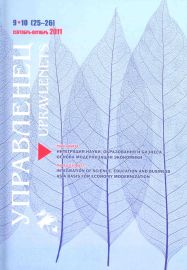 |
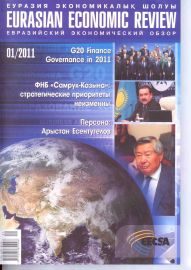 |
Scripts:
- Beroušek, P., Hüttlová, E.: Organisation of Work in Companies. Prague: Oeconomica, 2004.
- Dušková, L.: Labour Relations. Prague: Oeconomica, 2005.
- Dvořáková, Z.: HR Management Practices – Workbook. Prague: Oeconomica, 2006.
- Hanáková, E., Matoušek, O.: Occupational Hygiene. Prague: Oeconomica. 2006.
- Paleček, M. et al.: Prevence rizik. Praha : Oeconomica. 2006.
- Kleibl, J. et al.: Human Resource Management 2 – Part 2. Prague: Oeconomica. 2005.
- Kleibl, J., Hüttlová, E., Dvořáková, Z.: Employee Motivation and the Creation of Wage Systems; Prague: UEP, 1998.
- Koubek, J.: Human Resource Management 2 – Part 1. Prague: Oeconomica. 2006.
- Němec, O.: Human Resource Management and the Social Development of Employees in an Organisation. Prague: UEP, 2002.

